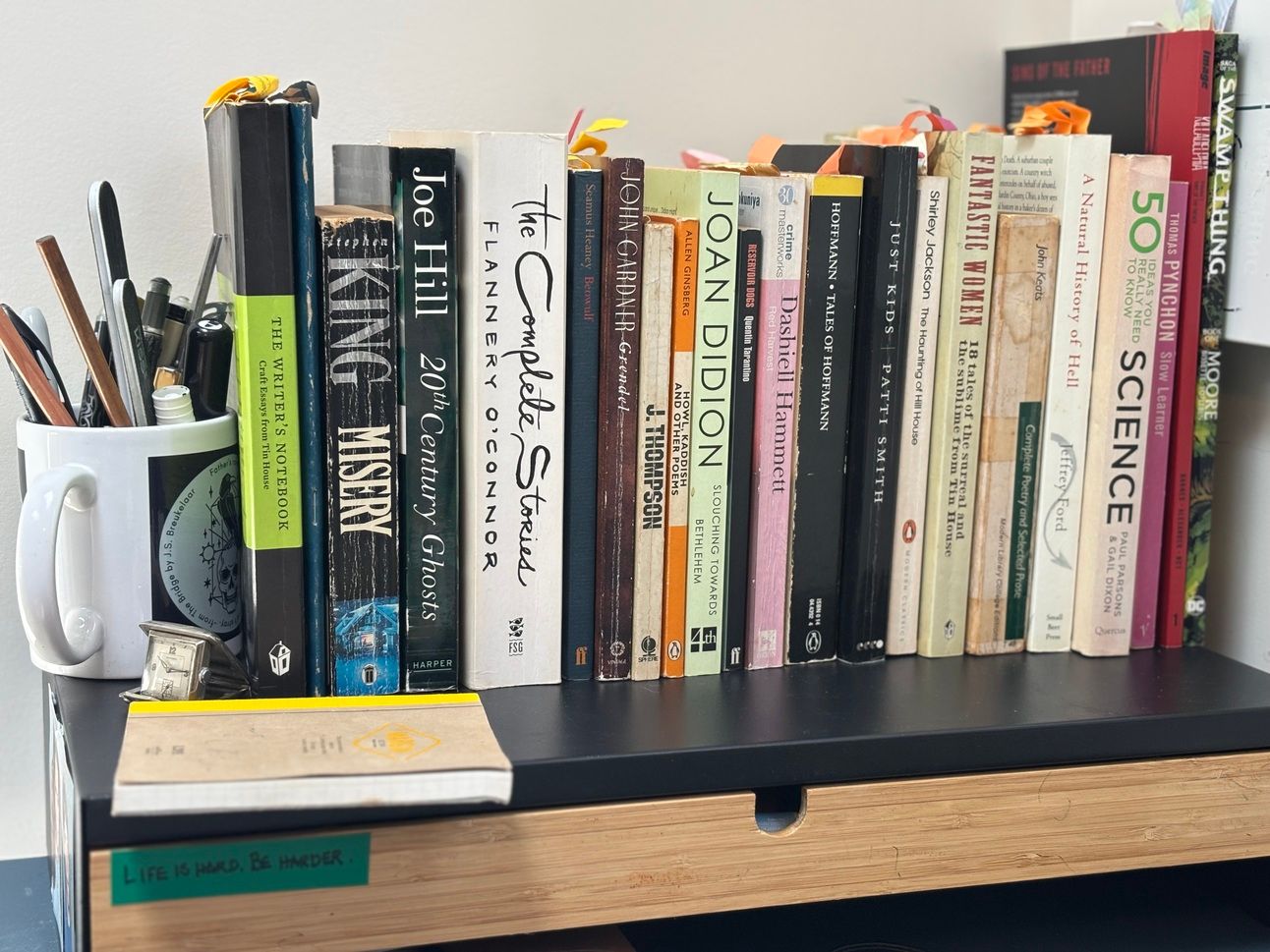
J.S. Breukelaar’s Shelfie
Here is my desert-island stack. The handful of books I keep on my desk, have kept there ever since I started writing. A couple I’ve added over the years, but basically it hasn’t changed. I’ve read so many game-changing books over the last year or five. Mariana Enriquez’s The Dangers of Smoking in Bed, Kaaron Warren’s The Underhistory, Keith Rosson’s Smoke City, Stephen Graham Jones’s The Only Good Indians—all these books live under my skin and on the bookshelves that take up the walls of my office.
Because there’s only so much room on a desk.
So, here we have a signed first edition copy of Ink Alchemy: Vol. 4 by Justin Kamerer and Jeral Tidwell at Crackhead Press. A gift from my son after I published a poem about haunted tattoos. These images continue to needle their way onto the flesh of my characters.
Then there is Stephen King’s Misery. Why Misery? I have two shelves of King’s books on my walls, why would I grab this one in a fire? Because I can’t think of a truer book about the addictive agonies and ecstasies of our art. Because I open it to feel less alone. “Pardon me, please. Now I must rinse. Now I must— “
Reservoir Dogs by Quentin Tarantino remains my forever dialogue coach and is always reminding me to shut up. Thomas Pynchon’s Slow Learner, not just for his early stories, including “Entropy” and “Lowlands,” but also for the Introduction in which he gently commits to owning the mistakes in his early work, “on the chance that others may be doing it as we speak, and be able to profit from my error.”
“I still don’t even know for sure what a tendril is. I think I stole the word from T.S Eliot. I have nothing against tendrils personally, but my overuse of the word is a good example of what can happen when you spend too much time and energy on words alone.”
Seamus Heaney’s Beowulf, a gift from my daughter, and John Gardner’s Grendel, neither of which I can live without. The story of Beowulf from Grendel’s febrile, murderous, guilt-ridden solitude. Leafing through its age-spotted pages now I can’t settle on a passage. A house made of broken jewels, the light hits it in a different way every time you look.
I bought Joe Hill’s 20th Century Ghosts before I knew who he was and the rest is history, of course, including me finding myself at the PS Publishing family table many years later. But I was blown away by the stories even then, especially “Pop Art” and “Black Balloon,” and went onto read Heart Shaped Box right after that, which is probably still my favourite Joe Hill novel.
Let’s see, what else we got? Jeffrey Ford’s A Natural History of Hell because of all the perfect stories, but especially “A Terror,” a tale of Emily Dickinson’s deal with Death, which I think I’ve read and taught a hundred times. Alan Moore’s Saga of the Swamp Thing because of how the words vie with the art to bring a broken-hearted muck man to life. Killadelphia is sad and gorgeous and terrifying and when I want to be reminded of how it’s possible to be all three, I turn to any page. Jim Thompson’s The Getaway for the trippiest nightmare of a crime novel ever written; Hammett’s Red Harvest for the best opening line in the history of opening lines.
“I first heard Personville called Poisonville by a red-haired mucker named Hickey Dewey in the Big Ship in Butte. He also called a shirt a shoit.”
This book, more than any other, was my diving board into the murk.
J.S. Breukelaar is an American-Australian author of dark fiction. Her collections and novels have won or been nominated for numerous Shirley Jackson, Aurealis and Ditmar Awards. Her most recent novel is Remedy. Her stories can be found in publications such as Apex, Lightspeed and The Dark, as well as several Years’ Bests. You can find out more on her website and elsewhere at @jsbreukelaar.
Shelfies is edited by Lavie Tidhar and Jared Shurin. For more Shelfies, please join us on Instagram at @shelfiesplease.